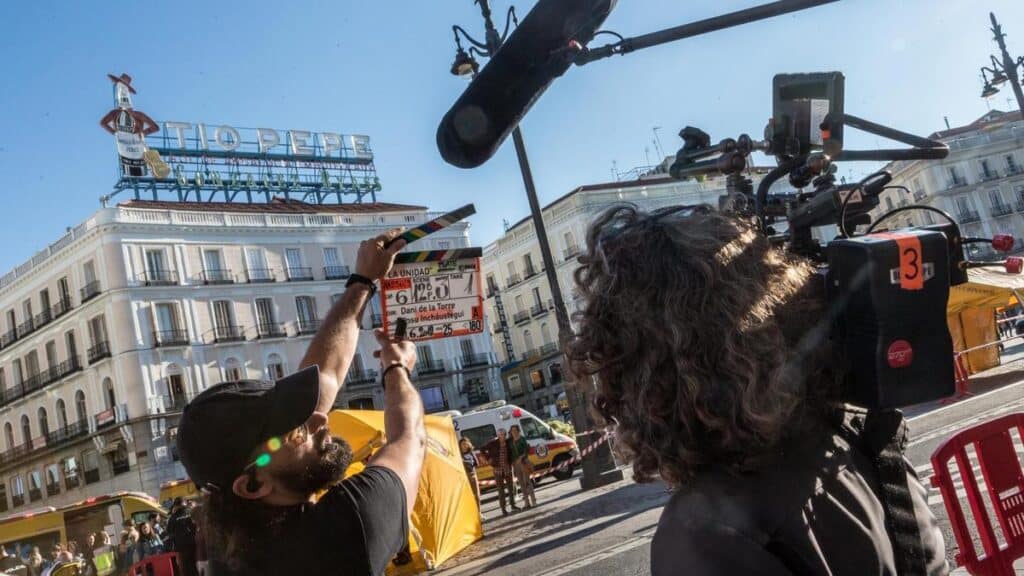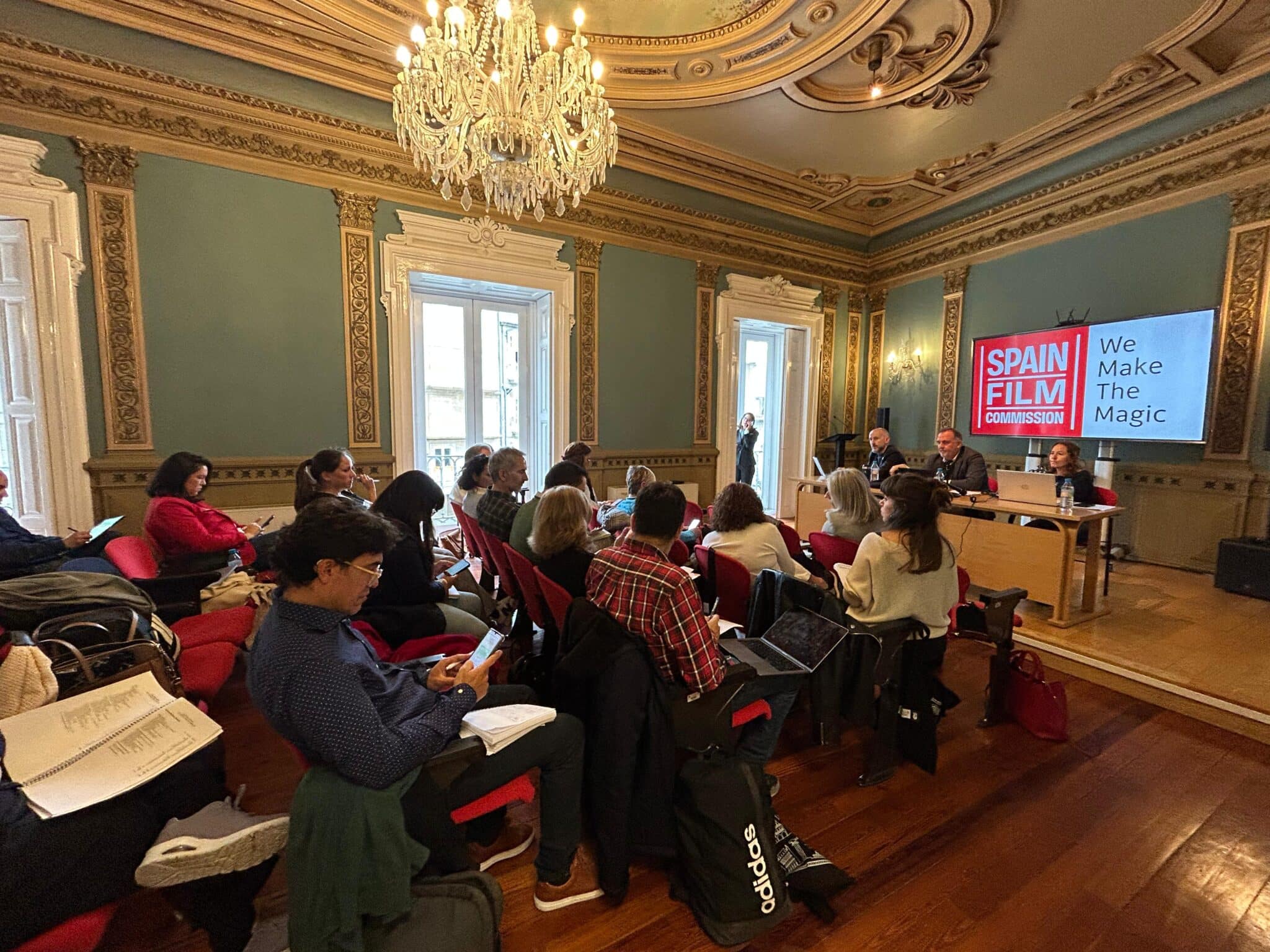Obtaining filming permits in a foreign country can be a bureaucratic maze. In Spain, every audiovisual production, whether a film or a series, requires a clear understanding of the processes and local regulations. This essential guide breaks down everything you need to know to secure your permits and film without setbacks.
When is a filming permit required?
In Spain, a filming permit is required when a public space is going to be used for the recording of audiovisual works, whether films, series, commercials, or any type of production that involves the use of public roads.
Filming permits are generally managed by Town Halls and are necessary to ensure that filming does not hinder traffic or affect people’s safety, as well as to regulate the use of public and private spaces.
Who issues filming permits in Spain?
The issuance of filming permits in Spain depends mainly on the specific location chosen for the occasion. Who should you request the permit from? Let’s take a look at the different entities that issue filming permits in this beautiful country.
National agencies and state-owned locations
For foreign films and film co-productions, the Institute of Cinematography and Audiovisual Arts (ICAA), attached to the Ministry of Culture and Sport, can grant filming licenses. If you want to shoot in Spain, you may need to go to this centralized agency. However, in some cases, the management of permits may be shared, depending on the nature of the film and the type of location needed.
If the recording requires road closures or traffic regulation, a permit from the General Directorate of Traffic (DGT) will be required.
Regional film commissions
In Spain, the territory is divided into what is known as “Autonomous Communities.” Each of these regions has a certain degree of self-government, allowing them to issue filming permits. Depending on the location and type of shoot, specific permits from the Autonomous Community where the scenes are going to be filmed may be required. A good example is Film Madrid, an agency that manages some permits and provides information on the regulations for filming in the Community of Madrid.
Municipal and town hall permits
Sometimes, foreign filmmakers must contact the corresponding Town Hall to film in Spain. These are permits generally required when public roads are going to be occupied or when municipal public spaces are going to be used.
At the local level, you may also need to request permission to film from the relevant traffic authority.
Permit application process and timelines
Normally, a notice period is required to apply for permits, which may vary depending on the complexity of the shoot and the location. In any case, it is important to comply with all regulations to avoid problems and ensure the successful completion of the filming.
Typical processing times
The usual processing time to obtain a filming permit in Spain varies, but it is generally recommended to apply at least 15 working days in advance for shoots on public roads, park and garden areas, or if special district permits are required. For simpler cases on public roads, it can be processed with 7 working days’ notice.
Fast-track options and fees
In Spain, there is no fee that allows filming permits to be expedited. Instead, fees vary depending on the location and type of production, but generally include an administrative fee for the application and another for the occupation of public roads. The administrative fee can be around 48.65 euros for the authorization, according to the Madrid City Council. For the occupation of public roads, a fee is usually applied per square meter or per linear meter per day. Additionally, there may be extra fees for services such as local police support or street closures.
Required documents and insurance
To apply for a filming permit, you will need a formal application, which can be electronic or in person, along with documentation including civil liability insurance and, in some cases, a map of the filming area and vehicle parking. Usually, these are the necessary documents:
- Application form: It can be an official form from the town hall or an electronic application.
- Identification of the applicant and representative: DNI/NIE, passport, company tax ID (CIF), etc.
- Proof of representation: In case the applicant is not the person carrying out the filming, a notarized power of attorney or a statement authorizing the representation is required.
- Detailed filming information:
- Location: Map with the area of occupation, including vehicle parking and traffic closures.
- Dates and schedules: Start and end dates of the filming, as well as specific times.
- Type of filming: Whether it is a feature film, short film, commercial, documentary, etc.
- Area of occupation: Square meters of public road occupation.
- Civil liability insurance: Covering possible damages to third parties during filming.
- Proof of payment of fees: In some cases, a fee must be paid for the issuance of the permit.
- Other documents: Depending on the town hall and type of filming, additional documents may be required such as special vehicle circulation permits, safety plans, etc.
Key film-office contacts and portals
Are you going to apply for a filming permit? If you are about to take your first steps to shoot in Spain and don’t know where to start, we point out some key places to contact initially. Remember!
Institute of Cinematography and Audiovisual Arts (ICAA)
The ICAA is an autonomous body attached to the Ministry of Culture, responsible for planning support policies for the film and audiovisual sector. In addition to contacting them to request your filming permit, they can be of great help during the process.
General Directorate of Traffic (DGT)
The General Directorate of Traffic is an autonomous body of the Government of Spain, dependent on the Ministry of the Interior and responsible for implementing road policies on Spain’s state-owned roads.
Film Madrid
Film Madrid is the Filming Promotion Office of the Community of Madrid. Among its functions, it stands out for providing advice, location scouting, and managing permits to film in Madrid. If this region is the target of your next shoot, now you know where to go!
Drone, night shoots and other special cases
To film with drones in Spain, it is necessary to comply with a series of requirements and obtain the necessary permits, especially if the drone is for professional use or weighs more than 250 grams. Drone regulations in Spain are governed by the Spanish Aviation Safety Agency (AESA). Before filming with a drone, keep these considerations in mind:
- Registration with AESA: If the drone weighs more than 250 grams, you must register it with AESA as an operator.
- Pilot license: A license or pilot certificate is required to operate drones over 250 grams, especially for professional use.
- Civil Liability Insurance: It is mandatory to have insurance that covers possible damages to third parties that the drone may cause.
- Specific permits: Depending on the location and type of flight (restricted areas, night flights, etc.), additional permits may be required, which must be requested from AESA or the Air Staff, as appropriate.
- Regulations: It is essential to know and respect the limitations on height, distance from airports, urban areas, etc.
Shooting in Spain offers end-to-end support for securing your permits
Navigating the complex process of obtaining filming permits in Spain can be a challenge, especially for international productions. At Shooting in Spain, we have an in-depth understanding of national, regional, and municipal regulations, as well as specific requirements for special cases such as drone filming or night shoots. By partnering with us, you ensure comprehensive support from start to finish, allowing you to focus on the creativity and success of your project while we take care of making sure every permit is in order. With Shooting in Spain, your audiovisual production in Spain will be in the best hands.












